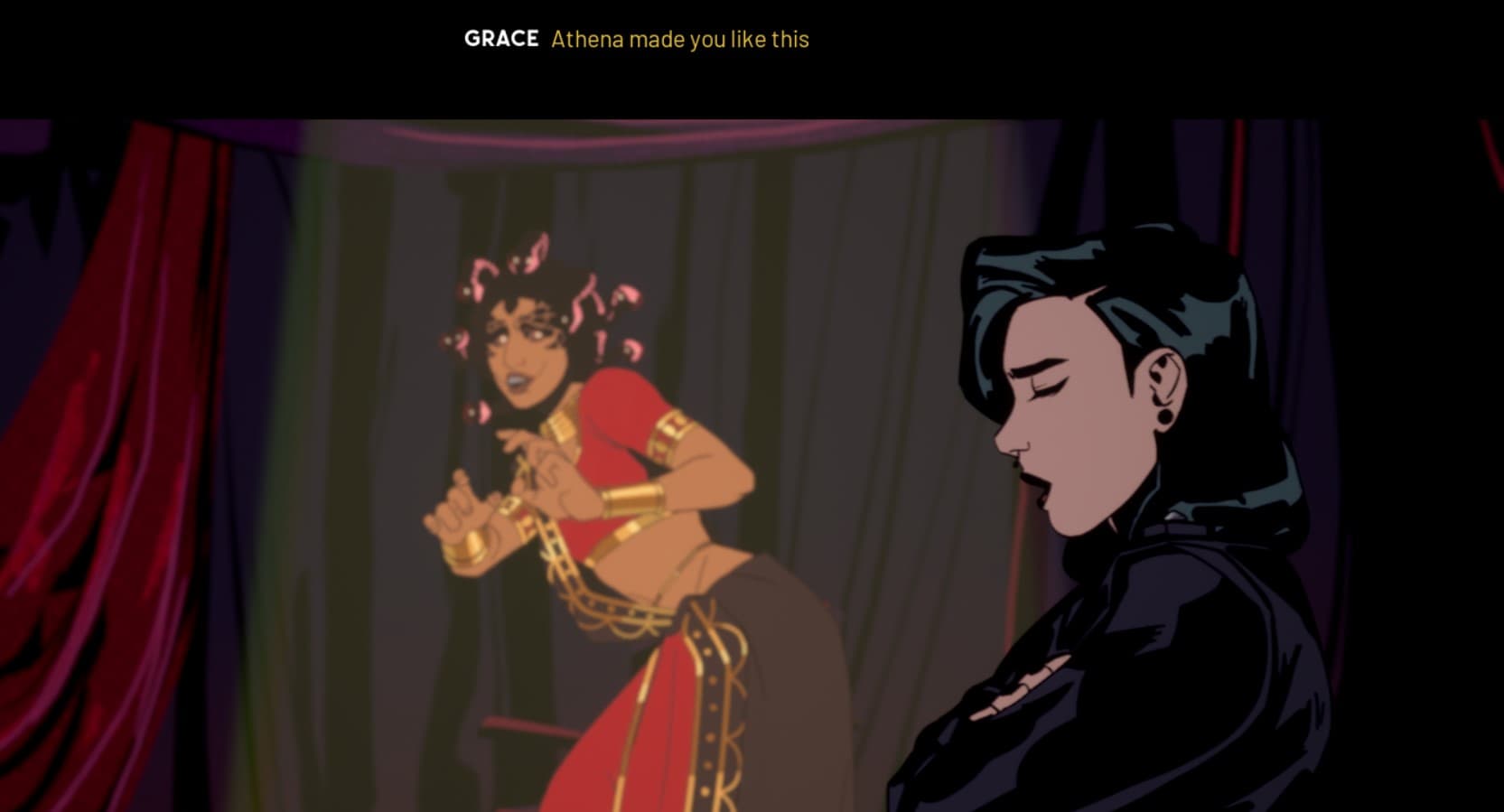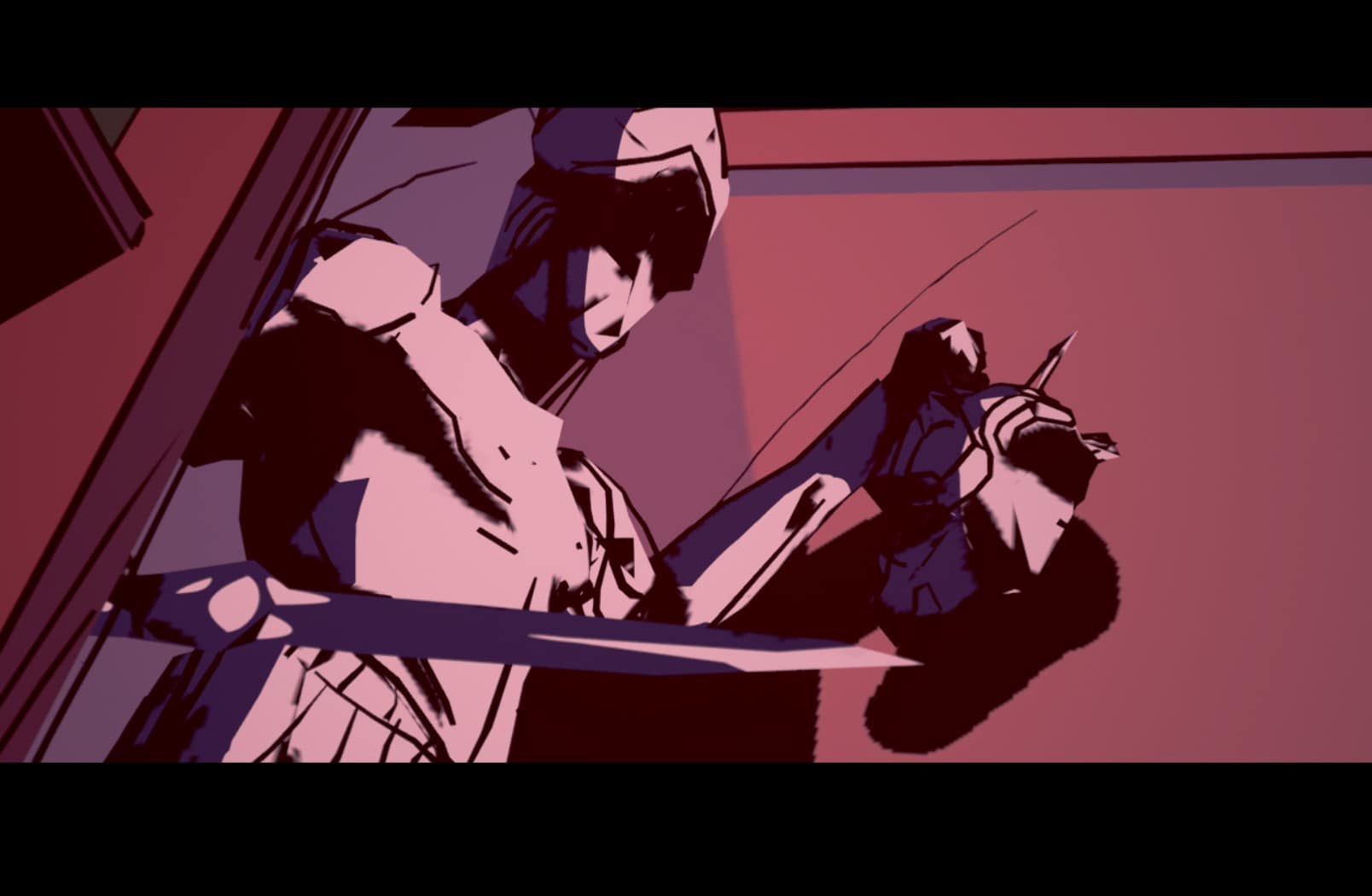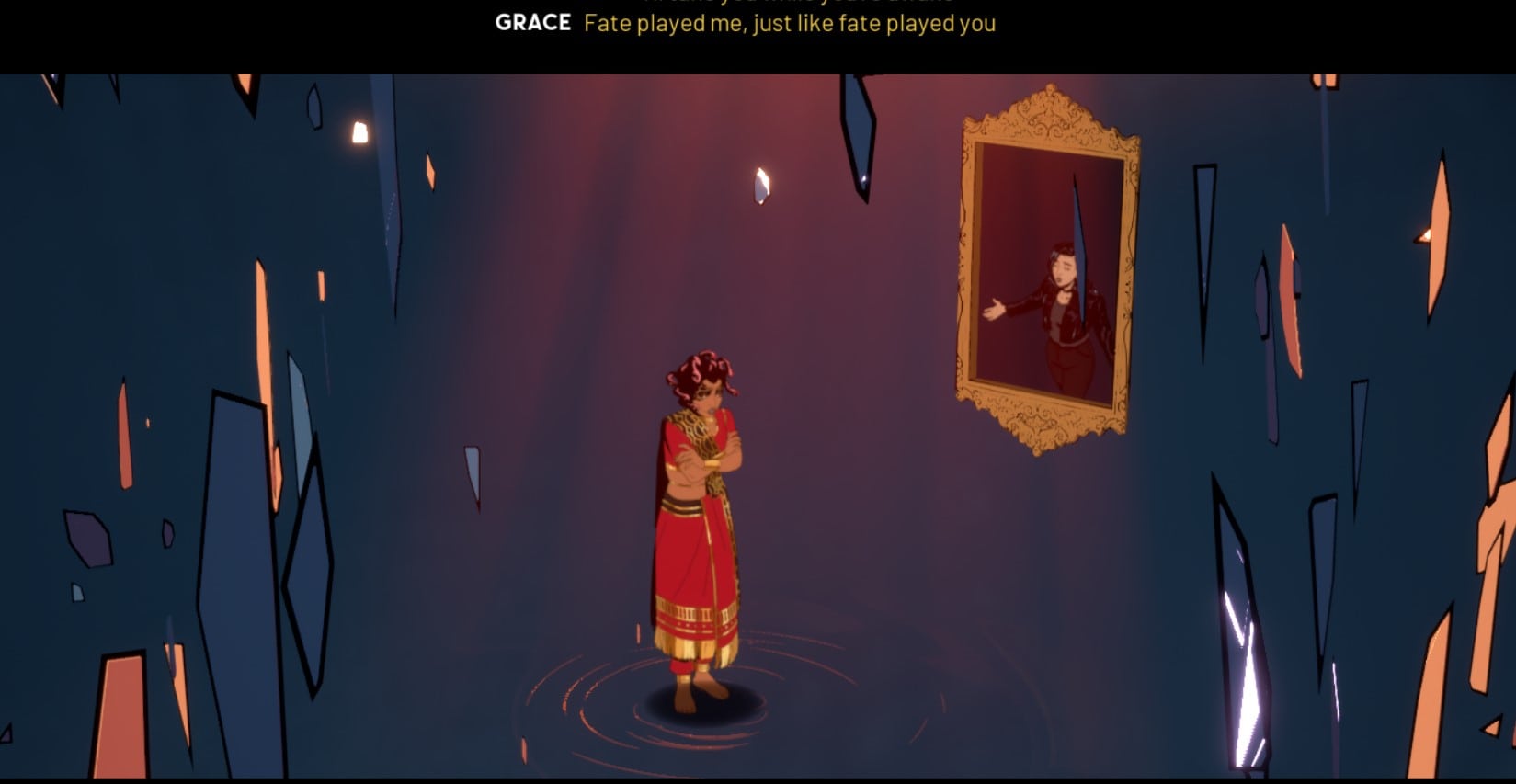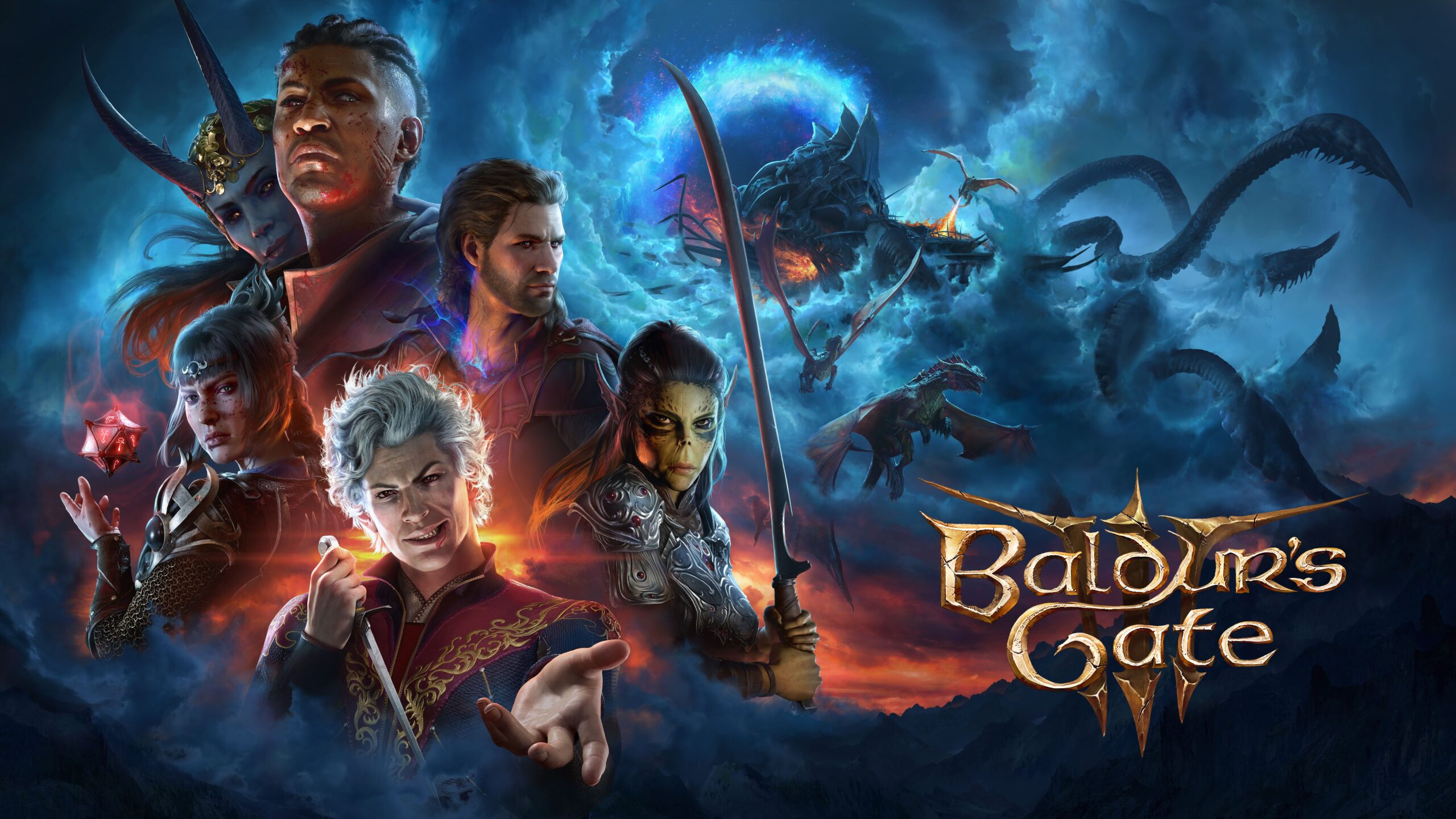
Image Source: Summerfall Studios
Stray Gods’ story about moving forward leaves Medusa behind
Note: This article contains spoilers for Stray Gods, as well as discussions of sexual assault.
Stray Gods: The Roleplaying Musical is pretty much exactly what the title implies. The player character, Grace, inherits the soul of a murdered Muse (yes, that kind of Muse) and winds up on trial for the crime. With a week to prove her innocence in the face of total annihilation, Grace tracks down and talks with several other immortal beings that are also in the modern world with her. While most of these are entities that were once worshipped as gods, like Apollo and Athena, others are humanoid creatures of legend, like the Minotaur Asterion, and the gorgon Medusa.
Unlike the Idols, who can pass a piece of their soul onto another person when they die, granting them a weird form of immortality that includes a short period of memory loss of their various past lives, Medusa is just an immortal being in the traditional sense. She can’t pass herself onward or enjoy the temporary relief from past memories which comes with that process, meaning she has been the same person in the same body since she was cursed by Athena back in ancient Greece. That curse is what turned her into a gorgon, a snake-headed creature with the ability to turn people to stone with a look, in the first place.
The Idols consider Medusa to be a grotesque beast, with Apollo calling her a “hideous monster.” They do this all while knowing that Medusa’s fate came at Athena’s hands, a goddess the gorgon was a priestess for when she was cursed. Stray Gods doesn’t detail the incident beyond Medusa telling Grace that the goddess of wisdom cursed her because she “said she had been bad,” even though she wasn’t, according to her. This then leans into a whole decision arc where Grace debates if she should believe Medusa or not.

The specific focus on belief made me wonder why Stray Gods doesn’t flesh Medusa’s backstory out more, especially once we get Athena’s full villain reveal. After all, the story from Ovid goes that Athena cursed Medusa, her own priestess, because Posideon raped her in one of Athena’s temples, “defiling” it. Because she was a petty and cruel goddess who didn’t think she could do anything to the sea god, she punished Medusa instead. This is a pretty perfect example of misogyny in action, and further demonstrates the vindictive streak Athena conveys throughout Stray Gods and admits to during the game’s finale. And yet, instead of Stray Gods treating Medusa as the victim she is, and trying to provide a path to redemption/healing that the other, frankly worse, Idols get, it instead flirts with compassion for the gorgon, while ultimately abandoning her as a lost cause.
Grace tracks down Medusa because she has information about Calliope’s final hours. Like every encounter in this roleplaying musical, the two have a singing battle thanks to Grace’s powers as a Muse. During this confrontation, you can choose dialogue/lyric options that appeal to Medusa’s emotions, trying to make her realize how similar the two of you actually are. Athena cursed her against her will, Calliope turned Grace into an Idol without her consent or even knowledge. It’s honestly a great line of argument, and it works, allowing you to pry information from the gorgon about what happened that night. But Grace’s sincerity in it ends up ringing hollow by the end of the game.
During this encounter, Medusa is also, admittedly, trying to eat Grace. Apparently part of her curse is an overwhelming hunger for flesh, human or otherwise. Though the emotional appeal saves Grace from the gorgon’s belly, her near-death experience becomes a hang-up for her throughout the rest of the game, enough of one that even if you don’t rat Medusa out to Athena about her slip-up, Grace still doesn’t seem to really care about reversing the curse or otherwise trying to make things right for Medusa.

Don’t get me wrong, you can bring it up when you talk with Athena before your trial, and again during it. But in the former conversation, Athena tells Grace there’s no way to break the curse now, as she doesn’t remember how. Grace just basically takes her word for it, and during the latter conversation, Athena’s treatment of Medusa is used more as a weapon for her character assassination than as a valid issue that needs to be dealt with.Upon playing the game a second time, I noticed a statue of Perseus holding a gorgon’s head displayed prominently in Athena’s office, belying the truth that the goddess of wisdom has never had any intention of righting her wrong. Athena and the Chorus are at Grace’s mercy by the time this confrontation wraps up, giving the Muse an opportunity to force the issue, but instead Medusa is left in the cold yet again.
Once Stray Gods reaches its finale, Grace gets a rundown on what happened to all of the characters in the aftermath of her final decision. In line with the game’s overall themes, and your choices along the way, the Idols will have changed, found ways to move forward, and try again. In my first ending, Apollo became the temporary leader of the Chorus before it would eventually disband. The guy who admitted to being a rampant sexual predator in his ancient Greece days got a second chance at doing things right. Athena, who had Calliope killed and then wanted to execute Grace for it, got to flee back to the old country to look for other Idols who may resurface now that the others have gone public. Even the game’s other legendary monster, Asterion the Minotaur, is given a new lease on life as a bumbling romantic who may get the opportunity to be with the woman he loves.
And Medusa? Medusa is ultimately taken into the custody of a “mortal government” of her own free will because she fears she’ll eat someone if left to her own devices. Grace only finds out about this after the fact, and there are no further discussions about trying to lift the gorgon’s curse or doing anything to make things up to her, presumably because Grace is still angry that she tried and failed to eat her once. I’m not at all opposed to these other characters getting a chance to move forward with the acknowledgement that they’re not the same people anymore and they have the capacity to change. What I take issue with is granting this to the people who caused a lot of harm without extending that same grace to their victims.

Getting this ending after specifically trying to help Medusa when I could, advocating for her, and empathizing with her as Grace made all of the Muse’s efforts feel performative, hollow, and even manipulative. In the end, by Stray Gods’ own reckoning, the gorgon is nothing more than a monster, a lost cause that can’t be fixed or controlled. Leaving her situation at that, after everything we learn about who Athena is, and after offering all of the other immortals chances at redemption and happiness, is a huge disappointment, and a disservice to both her character and the game’s writing overall.
Stray Gods is at its strongest when it comes to its characters and their interpersonal drama/histories. We get to see these so-called gods as they likely would be, flawed and nearly as human as the rest of us, just with the ability to body-hop across centuries. None of them are purely “good” or “bad,” so much as complex characters with flaws and trauma that impact their decisions. But Medusa isn’t afforded this same depth, and it stands out starkly, in no small part because its treatment of a survivor as nothing more than a bargaining chip is jarring and goes against the game’s very message.

If you like what we do here at Uppercut, consider supporting us on Patreon. Supporters at the $5+ tiers get access to written content early.






Thought you might be interested to know that it is possible to get a good ending with Medusa. I haven’t seen it personally but I heard it in the Blue Edition soundtrack. I read you have to side with Apollo in Act 1 and have the clever trait. Kind of a bummer that it’s such narrow parameters. Wish there were more ways to save her.
Also it seems you got the good ending for Athena. I’ve only gotten the bad one where she wanders off doubting herself. Would be interested to hear how you got the good ending.
Thank you for writing this article! It does make good points. Take care!
You can get it from siding with either of them, I believe, but it’s a clever-specific response: “[X] can help you”. I’ve gotten it with Persephone before, and in that ending, she left the bar to Medusa, if I remember right.